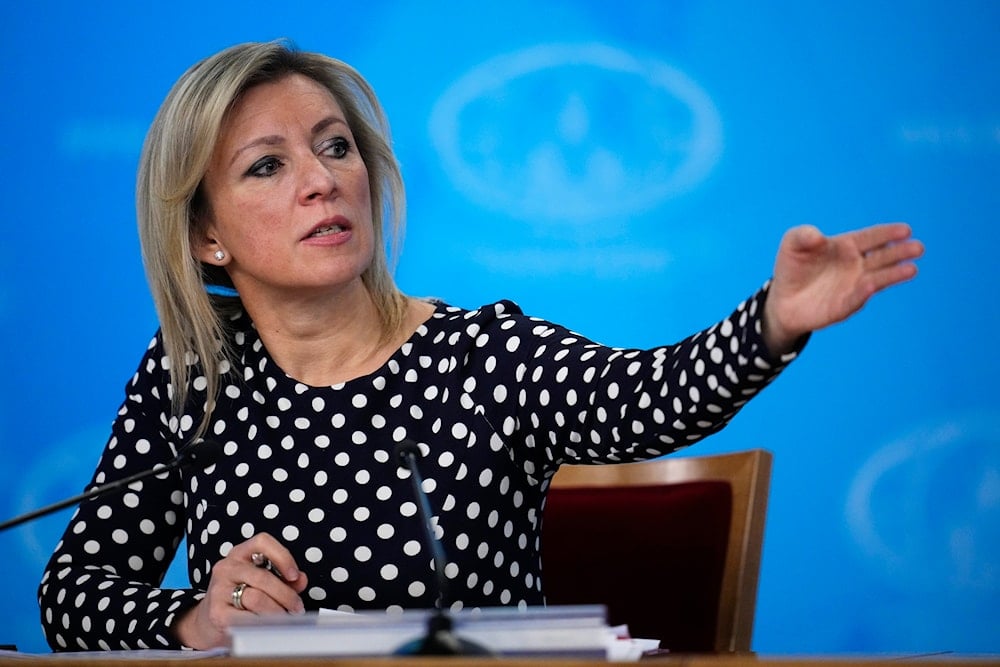Russia urges non-regional actors to support Armenia-Azerbaijan peace
Russian Foreign Ministry says non-regional actors must aid Armenia-Azerbaijan peace, not fuel tensions, and warns "Israel’s" Gaza expansion will worsen the crisis.
-

Russian Foreign Ministry spokeswoman Maria Zakharova gestures during Russian Foreign Minister Sergey Lavrov's annual news conference in Moscow, Russia, Thursday, Jan. 18, 2024 (AP)
The Russian Foreign Ministry has stressed that non-regional actors involved in the Armenia-Azerbaijan peace process should work to strengthen stability rather than create new obstacles, warning that disruptive engagement could undermine regional efforts.
Speaking on Saturday, Foreign Ministry spokeswoman Maria Zakharova said any participation by non-regional states must contribute to peace.
"The involvement of non-regional actors should work to strengthen the peace agenda and not create additional difficulties and dividing lines. I would like to avoid the sad experience of Western assistance in conflict resolution in the Middle East," Zakharova stated.
She cited the European Union’s observation mission in Armenia as an example of activity that, in her view, irritates other regional actors.
Zakharova underlined that the optimal path to resolving issues in the South Caucasus lies in solutions developed by the countries of the region themselves, with the support of neighboring states: Russia, Iran, and Turkey.
Read more: US president brokers Armenia-Azerbaijan peace deal, wins 'Trump route'
'Reconciliation must remain within a regional context'
Her remarks came a day after the leaders of Armenia, Azerbaijan, and the United States signed a joint declaration at the White House aimed at advancing a peaceful settlement between Yerevan and Baku.
"We consistently support all efforts that contribute to achieving this key goal for regional security. In this regard, the meeting of the leaders of the South Caucasus republics in Washington, mediated by the US side, deserves a positive assessment," Zakharova said.
At the same time, she stressed that reconciliation must remain within a regional context, based on a balance of interests and respect for the priorities of the parties and neighboring countries.
Moscow, she added, will analyze Washington’s statements on unblocking regional communications, noting that existing trilateral agreements involving Russia remain relevant.
Russia warns of consequences of 'Israel’s' Gaza expansion
In a separate statement, Zakharova criticized "Israel’s" plan to expand its offensive in the Gaza Strip, warning it would worsen conditions in the Palestinian enclave and have serious consequences for the entire Middle East.
The warning followed announcements by Israeli Prime Minister Benjamin Netanyahu that "Israel" intends to establish control over the entire Gaza Strip to create a "security perimeter" before transferring it to a “civilian administration.”
Netanyahu’s office later confirmed that the Israeli security cabinet approved his proposal to inflict a “conclusive defeat” on the Palestinian resistance movement Hamas and take control of Gaza City.
"The implementation of such decisions and plans, which provoke condemnation and rejection, is fraught with aggravating the already extremely dramatic situation in the Palestinian enclave, which has all the signs of a humanitarian catastrophe," Zakharova said.
She warned the move would undermine international de-escalation efforts and threaten broader regional stability.
Read more: Netanyahu's Gaza remarks undermine ceasefire efforts: Hamas

 3 Min Read
3 Min Read










